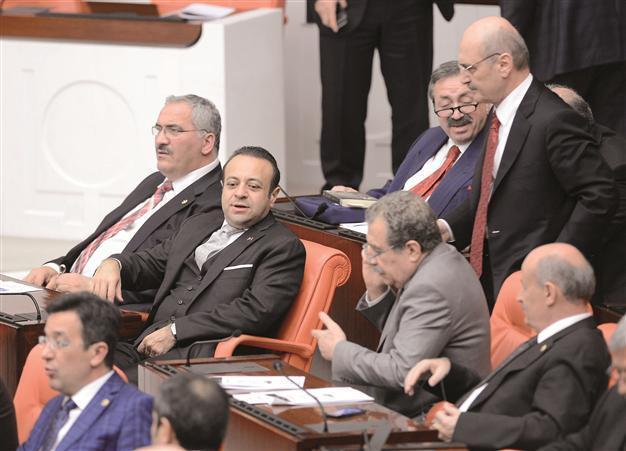Turkey’s parliamentary commission on graft queries ex-ministers’ wealth
ANKARA

Parliament's investigation commission is probing former ministers Bayraktar, Bağış, Çağlayan and Güler. AA Photo
A parliamentary commission into corruption among senior members of the government has questioned a sudden increase in the wealth of two former ministers on the back of allegations that they accepted bribes.
A company owned by former Environment and Urbanization Minister Erdoğan Bayraktar has trebled in size in the past three years, while former EU Minister Egemen Bağış’s business partner has seen "a significant increase" in his wealth since the beginning of 2013, according to the commission’s inquiry.
Parliament decided to establish an investigation commission to probe former ministers Bayraktar, Bağış, Zafer Çağlayan and Muammer Güler on May 5, after deliberations between the political parties in the legislature.
The four ministers were removed from the Cabinet after a huge graft operation in December 2013 highlighted their relations with shady Iranian-origin businessman Reza Zarrab, who allegedly paid them a number of bribes over the last few years.
A company owned by Bayraktar’s family increased its wealth from 17.5 million Turkish Liras in 2010 to 58.2 million liras in 2013. The commission asked for the details of real estate that Bayraktar’s firm bought in Kadıköy at a price of 42 million liras one year ago.
The inquiry said Bağış and his wife, Beyhan Bağış, owned eight properties and possessed 513,000 liras, $24,300 and jewelry worth around 192,000 liras. Meanwhile, the inquiry reported that significant deposits were made to the bank account of the partner of Bağış’s firm after Jan. 1, 2013. It said that the individual’s identity and relations were important for the commission. Bağış sold two of his properties at below the market value, the inquiry added.
“There is no significant increase in the bank accounts of [Erdoğan Bayraktar and his wife] during the period when he was a minister. Besides [the properties] they gained through inheritance, they bought two pieces of real estate,” said the commission’s inquiry. One of the estates was paid with the money his company owed to him. The other estate was paid for with money he gained from sale of another estate, according to the inquiry.
Meanwhile, Bağış has admitted to receiving gifts including “chocolate, shirts and ties” from Iranian-Azeri businessman Reza Zarrab and said he helped some of Zarrab’s friends receive visas, speaking at the commission on Nov. 27. He also described “gift giving” as a “Turkish tradition.”
Bağış denied claims that he had received bribes from Zarrab, as he had been accused in the Dec. 17 investigation. However, he told the commission that acquaintances had sent “some gifts” to his house on special days such as New Year’s and religious holidays but denied that any of the gifts were monetary.
The former minister said he met with Zarrab in the United States via Zarrab’s wife, Ebru Gündeş, a well-known Turkish singer. He said Zarrab had sent a present as part of their “humanly relations” and he later called Zarrab to thank him for the gift.
Bağış also said he helped friends of Zarrab acquire visas for Turkey, but added that he had also extended such help to many other people.
When asked about Zarrab’s men talking over the phone about $500,000 in wiretap recordings that were included in the Dec. 17 probe, Bağış said he had “nothing to do with this.”
“These are phone conversations of people who have nothing to do with me. I have no link to that. Can a visa cost $500,000?” he told the commission.
Turkey’s media organizations were banned from reporting on the parliamentary commission in a Nov. 25 ruling.
However, a judge has since ruled that the ban was applied on publishing all speeches in the commission quote by quote, which is also banned in Parliament regulations. “Comments and criticisms” are not banned, the judge said.
